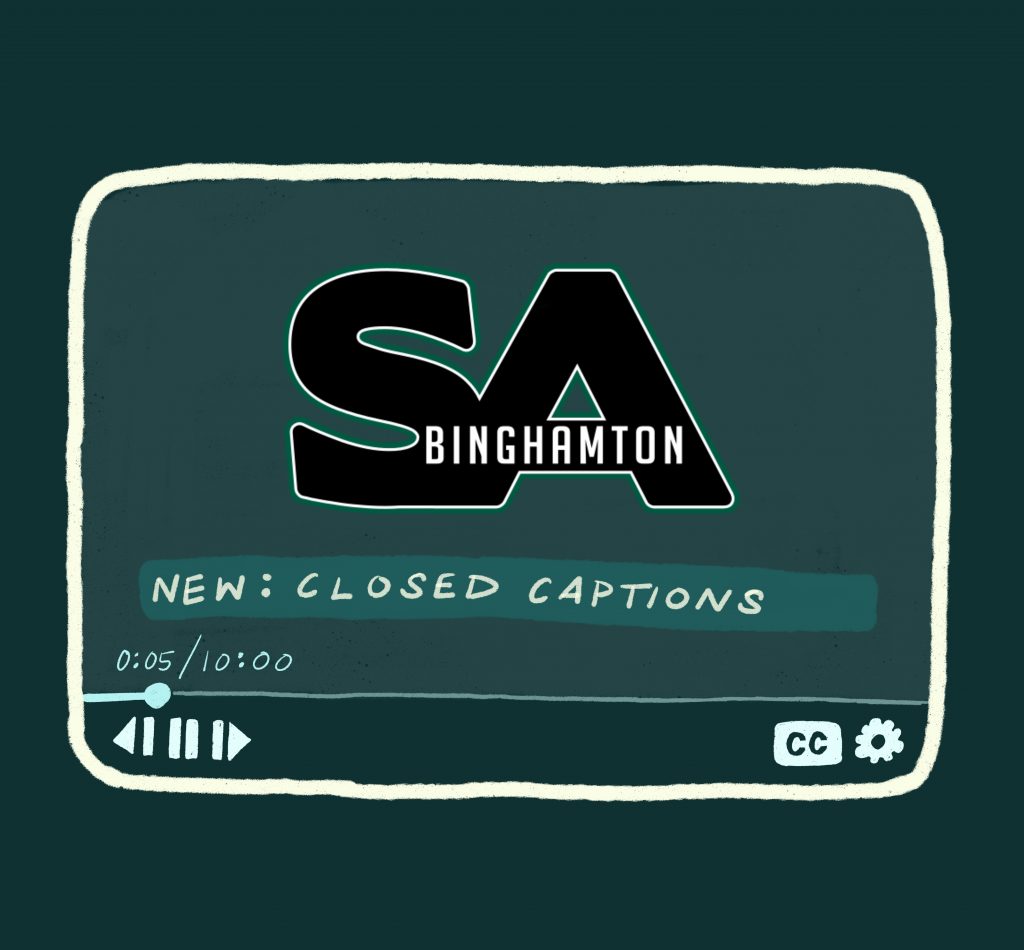The Binghamton University Student Association (SA) has passed new legislation addressing disability accessibility on campus.
On Nov. 9, the SA met to vote on the passing of a new resolution, titled “F2223-R3: Resolution to Address Electronic Disability Accessibility.” The resolution requires all SA video and photo media to be captioned, that the official SA website add a tab titled “Accessibility” — which provides resources and an explanation of the captioning guidelines — and that five to 10 minutes are spent discussing how to enact these recommendations during the SA Leadership Conference.
The resolution was initiated when the Technology Accessibility Advisory Group (TAAG) and Services for Students with Disabilities (SSD) approached the SA on partnering to create and enforce more technological accessibility — according to Luca Cassidy, the author of the resolution. Cassidy is a sophomore majoring in economics who serves chief of staff for the vice president for student success (VPSS).
“In the past, students have come to SSD about [BU] related media content not being captioned,” Cassidy wrote in an email. “SSD has a representative on TAAG who communicated this to the committee and then the committee decided to work on that issue. They contacted us, and I agreed to work with them. We worked together to write the bill and have worked on an addition to the SA website that would educate students on how to make accessible content, but that is not ready just yet.”
Cassidy explained that the resolution requires all SA media content have alt-text that briefly describes visuals, including flyers, videos and pictures. He also stated that SA chartered organizations are not required to follow the legislation, but would be “glad to help” those that do plan to expand their electronic accessibility.
“In addition to pictures, flyers would have their information in the alt-text as well,” Cassidy wrote. “Lastly, videos should have captions on them. We plan to add a tab on the SA website titled ‘Accessibility’ that goes into this with more detail and with examples, but that is still in production.”
The passing of the legislation addresses multiple articles within the SA Constitution regarding the equal representation of undergraduate students, transcribed in the legislation document, as well as concerns on electronic accessibility that have been raised previously.
Article I of the SA Constitution was included in the legislation document, which reads that the SA “cannot have rules or undertake actions which discriminate against, or give preference to, anyone on the basis of academic discipline, age (unless required by law, insurance or University policy), ancestry, disability, ethnicity, gender, marital status, military affiliation, nationality, political belief, race, religion or sexual orientation.”
The legislation document also addressed a 2017 investigation performed by The U.S Department of Education, Office of Civil Rights on BU. The investigation found that the University did not adhere to multiple acts regarding electronic and technology access on campus, including section 504 of the Rehabilitation Act of 1973 and Title II of the Americans with Disabilities Act of 1990.
Christen Szymanski, director of the SSD, expressed gratitude for the SA and their commitment to collaboratively with TAAG when producing a resolution on accessibility.
“We believe the resolution is only the first step in improving equitable electronic access,” Szymanksi wrote in an email. “We look forward to working collaboratively with the SA and other student groups in the future to provide materials and resources on how to make their electronic content more accessible.”
Jesse La Scala, founder of the Disabled Students Union (DSU) — which was developed in the fall 2022 semester — and a sophomore double-majoring in English and environmental studies, believes the legislation will bring more awareness to the disabled community on campus, along with improving accessibility. Since last semester, there has been a positive shift in highlighting disabled voices on campus, La Scala explained, and they hope the passing will continue the shift.
“While these are amazing initial steps, there needs to be continuation in momentum for disability justice on campus,” La Scala wrote in an email. “Accessibility and education on how to make spaces more accessible tend to be an afterthought. With the changes in the [SA], creates conversation on how to improve accessibility. I hope other organizations on campus will follow in their footsteps and strive to open opportunities for all students.”



